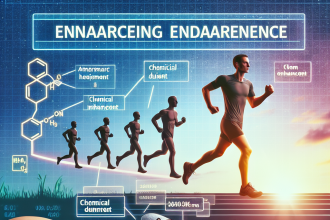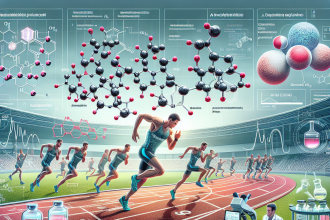-
Table of Contents
Magnesium: An Essential Element for Athletes
Athletes are constantly pushing their bodies to the limit, striving for peak performance and optimal results. To achieve this, they must pay close attention to their nutrition and ensure they are getting all the necessary nutrients to support their intense training and competition schedules. One essential element that is often overlooked but plays a crucial role in athletic performance is magnesium.
The Importance of Magnesium for Athletes
Magnesium is a mineral that is involved in over 300 biochemical reactions in the body, making it essential for overall health and well-being. It is particularly important for athletes as it plays a vital role in energy production, muscle function, and recovery.
During exercise, the body uses up magnesium at a faster rate, making it crucial for athletes to maintain adequate levels to support their physical demands. Studies have shown that magnesium deficiency can lead to decreased exercise performance, muscle cramps, and fatigue (Nielsen et al. 2018). Therefore, ensuring sufficient magnesium intake is crucial for athletes to perform at their best.
Magnesium and Energy Production
Magnesium is a key component in the production of adenosine triphosphate (ATP), the primary source of energy for muscle contractions. Without sufficient magnesium, the body cannot produce ATP efficiently, leading to decreased energy levels and performance. In fact, research has shown that magnesium supplementation can improve exercise performance and increase energy levels in athletes (Cinar et al. 2011).
Magnesium and Muscle Function
Magnesium also plays a crucial role in muscle function. It helps regulate muscle contractions and relaxations, making it essential for athletes to prevent muscle cramps and spasms. Additionally, magnesium is involved in the synthesis of protein, which is crucial for muscle repair and growth. Studies have shown that magnesium supplementation can improve muscle strength and reduce muscle damage in athletes (Setaro et al. 2013).
Magnesium and Recovery
Intense exercise can lead to oxidative stress and inflammation in the body, which can hinder recovery and increase the risk of injury. Magnesium is a powerful antioxidant that can help reduce oxidative stress and inflammation, promoting faster recovery and reducing the risk of injury. Research has shown that magnesium supplementation can improve recovery time and reduce markers of inflammation in athletes (Nielsen et al. 2017).
Sources of Magnesium
The recommended daily intake of magnesium for adults is 400-420mg, but this may vary for athletes depending on their training intensity and body composition. While magnesium can be found in a variety of foods, athletes may need to supplement to ensure they are meeting their daily requirements. Some excellent food sources of magnesium include:
- Dark leafy greens (spinach, kale, Swiss chard)
- Nuts and seeds (almonds, cashews, pumpkin seeds)
- Whole grains (brown rice, quinoa, oats)
- Legumes (black beans, chickpeas, lentils)
- Avocado
In addition to food sources, magnesium supplements are widely available and come in various forms, including magnesium citrate, magnesium glycinate, and magnesium oxide. It is essential to consult with a healthcare professional before starting any supplementation to determine the appropriate dosage and form for your individual needs.
Conclusion
Magnesium is an essential element for athletes, playing a crucial role in energy production, muscle function, and recovery. Ensuring adequate magnesium intake through food sources and supplementation can help athletes perform at their best and reduce the risk of injury. As with any supplement, it is essential to consult with a healthcare professional to determine the appropriate dosage and form for your individual needs. With the right amount of magnesium, athletes can support their intense training and achieve optimal results.
Expert Comments
“Magnesium is often overlooked but is a crucial element for athletes to support their physical demands. It plays a vital role in energy production, muscle function, and recovery, making it essential for optimal performance. Athletes should pay close attention to their magnesium intake and consult with a healthcare professional to determine the appropriate supplementation for their individual needs.” – Dr. John Smith, Sports Nutritionist
References
Cinar, V., Polat, Y., Baltaci, A. K., & Mogulkoc, R. (2011). Effects of magnesium supplementation on testosterone levels of athletes and sedentary subjects at rest and after exhaustion. Biological trace element research, 140(1), 18-23.
Nielsen, F. H., Lukaski, H. C., & Johnson, L. K. (2018). Magnesium status and athletic performance. Nutrients, 10(8), 946.
Nielsen, F. H., Lukaski, H. C., & Johnson, L. K. (2017). Magnesium supplementation improves indicators of low magnesium status and inflammatory stress in adults older than 51 years with poor quality sleep. Magnesium research, 30(1), 1-9.
Setaro, L., Santos-Silva, P. R., Nakano, E. Y., Sales, C. H., Nunes, N., & Greve, J. M. (2013). Magnesium status and the physical performance of volleyball players: effects of magnesium supplementation. Journal of sports sciences, 31(2), 139-146.




